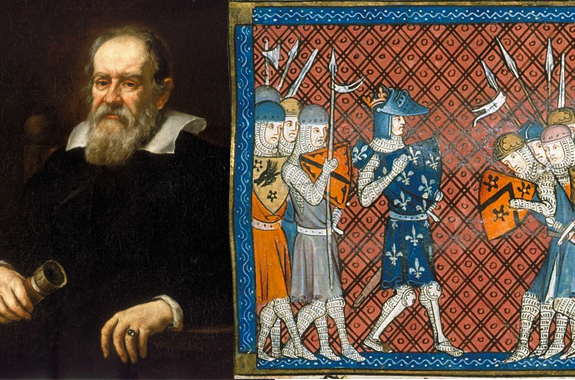

Contrary to what some people think, the word mythos is hardly a synonym for “lie” but rather suggests a symbolically-charged narrative which informs the moral imagination. Far from being inherently pernicious, myths are essential for any community, and in many instances express not only figurative but also literal truth. Of course, it is also the case that many myths really are unwholesome distortions of reality, and it is by way of such misleading myths that liberalism has come to dominate what was once the Christian West. This is where Gerard Verschuuren comes in with Five Anti-Catholic Myths: Slavery, Crusades, Galileo, Inquisition, Holocaust, recently published by Angelico Press.

A geneticist holding a doctorate in the philosophy of science, Verschuuren is at his most engaging when tackling the so-called war between science and religion. Although Verschuuren rightly acknowledges Galileo’s genius, passion, and piety, Verschuuren’s revisionist version of the famous scientist’s case makes it hard not to sympathize with officials forced to deal with an intemperate and occasionally irrational zealot. Noting that the work of Copernicus had initially been well received by both the papacy and the intelligentsia, Verschuuren argues that Galileo only got into serious trouble when he flouted an agreement he had made to treat the heliocentric cosmos as a theoretical model only. Had he not tried to force Copernican theory down everyone’s throats and sought to have the Bible reinterpreted in light of his work, there would have been no controversy:
The issue at hand, and for which he was ultimately sentenced, was not Galileo’s science; it was the violation of his earlier agreement. Let us also make very clear that his “heresy” was not the earth moving around the sun, as many nowadays claim it was. The Church and Her Inquisition do not deal with disputes in science but only with controversies in theology. And that’s where Galileo went wrong, venturing into religious territory and claiming theological expertise in scriptural interpretations – especially at a time when many “private” interpretations of the Bible were abounding.
Nor should we be so hasty in anointing Galileo an infallible prophet of science. Johannes Kepler calculated elliptical orbits for the planets; Galileo insisted on perfect circles. Jesuit astronomer-priest Horazio Grazzi argued that comets were genuine celestial bodies, moving in the region beyond the Moon; Galileo insisted that comets were merely “optical illusions.”
“The Church had the best of it,” declared Victorian biologist Thomas Henry Huxley regarding the proceedings, and Verschuuren explains why. One of Galileo’s supposedly indisputable proofs incorrectly attributes the tides to the Earth’s motion, and implies – not only incorrectly, but spectacularly so – that there should be only one high tide per day. Nor were there instruments sufficiently sensitive in Galileo’s time to rebut the most daunting challenge to heliocentrism: If the Earth moves around the Sun, shouldn’t there be an observable shift in the positions of the stars over the course of the year? In retrospect, exotic 20th century physics suggests that the soundest epistemological ground was held by Galileo’s long-suffering friend Robert Cardinal Bellarmine, who concluded that any theory of bodies moving relative to one another in space could at most “save the appearances.”
Of course, the fact that the feisty Galileo was never tortured nor even imprisoned does not touch the heart of the liberal argument against the Church, which is that the Church impinged upon the man’s freedom to proclaim whatever he liked. To his credit, Vershuuren addresses this key point during his discussion of the Inquisition:
Especially nowadays, many tend to see heresy in terms of a violation of “freedom of expression.” In this assessment, there are no heretical views – they are merely harmless, perhaps dissident, alternative views. In science, no one would defend such a position: saying that disinfection before surgery makes no sense is not just an alternative view but is definitely “anathema” in science.
In other words, every community and discipline must define itself, which means setting boundaries and limits on public behavior and discussion. A keen observation, though Verschuuren might carry it in a more provocative direction than he does. After all, a case can be made that modern liberals support a regime of thought-policing that is not only coercive, but extremely manipulative – and intellectually incoherent to boot.
Vershuuren’s rebuttal of the “Dark Ages” myth prompts a discussion of the crusades, and the concession that one particular episode – the sack of Orthodox Constantinople – was truly a black mark against the crusaders. At the same time Vershuuren also emphasizes that the plunder of the city was conducted against the express orders of Pope Innocent III, who had some sharp words for the expedition’s leaders:
How, indeed, will the church of the Greeks, no matter how severely she is beset with afflictions and persecutions, return into ecclesiastical union and to a devotion for the Apostolic See, when she has seen in the Latins only an example of perdition and the works of darkness, so that she now, and with reason, detests the Latins more than dogs?
A good question, one which adds a necessary historical dimension to the current situation between the Orthodox world and the West. Yet, obviously, the wedge driven through Christendom by the Fourth Crusade is not the reason the Left has seen fit to vilify knights, so Verschuuren devotes most of this chapter to taking apart the Islamophile position:
It is revealing to note that at no point did the crusaders attack the Muslim homeland, Arabia, but only those originally Christian territories that Muslims had conquered. In other words, if we want to use war terminology, the crusades to the East were in every way defensive wars, and certainly not aimed at Muslims as such. They were a direct response to Muslim acts – in an attempt to turn back or defend lands against Muslim conquests.
Thus when playing the victim card with respect to the Crusades, Muslim spokesmen call to mind “children who start fights and then complain when they lose.”
If the chapters dealing with the Galileo case, the Inquisition, and the Crusades comprise the strongest portion of Five Anti-Catholic Myths, the chapter dealing with slavery is the one that could stand the most development. To be sure, Vershuuren makes a number of good points. (That most educators and journalists gloss over longstanding Islamic trafficking in slaves reveals much about the priorities of political-correctness.) As he rebuts ill-informed accusations that the Church has been too soft on slavery, however, Vershuuren supports an oversimplified picture of the tensions which led up to the War Between the States.
Thus a select passage from Joseph de Maistre’s On the Pope proves apropos. Like Vershuuren, the ultra-conservative de Maistre observed with satisfaction that the slave trade gradually withered as the Church’s power spread. But even while affirming that the Church had throughout Europe worked “without rest for the abolition of slavery, a thing that no other religion, legislator, or philosopher had ever dared to undertake or even to dream,” the Savoyard diplomat also took pains to emphasize an insight absent in Vershuuren’s telling:
Christianity, which acts divinely, for the same reason acts slowly; for all legitimate operations, of whatever manner they be, are always accomplished insensibly. Wherever we find noise, confusion, impetuosity, and destruction, we may be sure that crime or folly is at work.
De Maistre’s aim was to celebrate the papacy, not defend the honor of Dixie, yet it is hard not to see his remarks as an unintentional commentary upon violent utopian revolutionaries like John Brown.
At the very conclusion of his book, Vershuuren debunks the slanders Communists spread about Pius XII following World War II. This is a straightforward task, for no honest historian will deny that Pius called attention to Nazi outrages during his 1942 Christmas address, or that the Church under his direction saved thousands upon thousands of Jews from persecution and death. Moreover, it is a matter of historical record that high-ranking rabbis and Israeli political leaders alike would later express warm thanks to the aforementioned pontiff for the resolve, spiritual integrity, and generosity he had shown during the war. So whence the malicious, dishonest legend of “Hitler’s pope”? Based on Vershuuren’s research, it seems the argument against Pius XII ultimately rests upon one indisputable fact: The pope failed to unconditionally enroll the Church in a military alliance that pulverized Monte Cassino, turned Urakami Cathedral into radioactive debris, and included in its number men like Stalin and Tito.
All in all, Five Anti-Catholic Myths is an eye-opening resource and an excellent starting point for those who would explore controversial episodes of history. It is also a book which highlights the need for a radical alternative to the self-righteous progressive triumphalism so prevalent in Western discourse. Key figures and images of the multidimensional drama of Christendom have been distorted, appropriated, and censored by those promoting a myth of secular liberation; the Left’s almost unbroken string of victories in the culture wars follows as a mere matter of course. How many modern Catholics know anything at all about the battle of Lepanto, the career of Saint Columba, or the martyrs of the Spanish Civil War? Sooner or later we will have to get beyond correcting the superficial, disingenuous liberal story, and set about rediscovering our own.
Five Anti-Catholic Myths: Slavery, Crusades, Galileo, Inquisition, Holocaust
by Gerard Verschuuren
Angelico Press, 2015
190 pages, paperback
If you value the news and views Catholic World Report provides, please consider donating to support our efforts. Your contribution will help us continue to make CWR available to all readers worldwide for free, without a subscription. Thank you for your generosity!
Click here for more information on donating to CWR. Click here to sign up for our newsletter.


